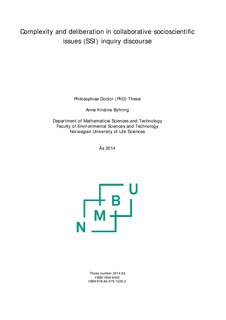Complexity and deliberation in collaborative socioscientific issues (SSI) inquiry discourse
Doctoral thesis
Permanent lenke
http://hdl.handle.net/11250/222787Utgivelsesdato
2014Metadata
Vis full innførselSamlinger
Sammendrag
Argumentation in science classrooms may be modeled on the practices of ‘science proper’, as
in experimental work and inquiry learning. Consequentially, argumentation is oriented around
matters of truth, or at least on matters of probability. Regarding less clear cut matters of
opinion and of priorities of action, as is often the case when deliberating on socioscientific
issues (SSI), neither science knowledge alone nor empirical evidence are able to provide
sufficient grounds for solving the question at hand.
This Ph.D. study explores 11th grade students’ oral use of textual and contextual resources:
how do students handle complexity, how do they deliberate, and what happens over time in
the students’ collaborative sense making? The exploration of complexity and student
deliberation takes as its point of departure an understanding of the multifaceted character of
socioscientific issues (SSI). The framing of student argumentation in science, concerning SSI,
is studied at the classroom level. The study consists of two case studies which have been
reported in three articles.
In the three articles, the educational challenges of SSI are addressed. The empirical material
originates from an open-inquiry student project with 11th grade students. Students chose an
issue from the main curriculum area of sustainable development and conducted a related
investigation in their local community. Finally, students submitted their group report on a
wiki platform. Among the chosen topics were: hunting in Norway, transport and CO2
emission, and forestry in Brazil.
Oral deliberation on task solving is pertinent during oral group activity. Scientific
argumentation, as it is defined in this study, was scarce in these students’ oral activity. Further
research on teaching and student argumentation is suggested, to meet the need for supporting
students’ scientific argumentation, as well as argumentation and deliberation in general. It is
further suggested that SSI learning situations can simulate the complexity of civic discourse,
involving specific topical and more general levels of complexity. The role and potential of
science education in civic education, however, is beyond the scope of this thesis.
This study provides a conceptualization of low and high complexity. The study also suggests a
macro structure of students’ deliberation, interwoven with three alternating patterns of
reasoning focusing on the content, the collaboration, and the composition of oral and written
deliberative argumentation. These components are also found to be the driving forces for
sustaining complexity, inquiry, and meaning making in SSI activity. The conceptualizations
of complexity and deliberation are the most important contributions of this Ph.D. study.
In Part two the three articles from the case studies are provided in full text in chapters 6, 7
and 8. In the first article, A1, the interplay between three levels of meaning are used to trace
intertextuality and complexity in the students’ collaborative reasoning. The second article,
A2, further explores students’ initiatives and responses within extended dialogues and
identifies characteristics and functions of students’ deliberation on task solving. The third article, A3, suggests that the common ground is negotiated in the process of meaning making
in the situated activity, and that it is driven by a need for decision making.
In Part one, the extended abstract, theoretical perspectives, the empirical material, research
design and method are presented along with summaries of the articles. Finally, three issues
are discussed, a theoretical issue, a design issue and an analytical issue. Theory on
argumentation and deliberation, including Toulmin’s argumentation pattern (TAP) formed the
starting point for analysis. Analytical tools are further based on theories on language use:
social functional linguistics (SFL), conversation analysis, and rhetoric.
